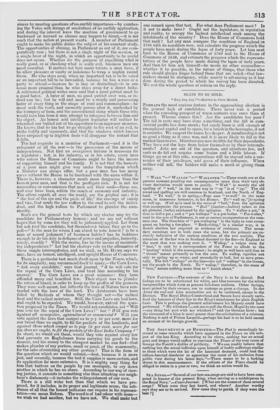" WALL "—" WALLOP "—" WALLorER."—These words are at the
present moment puzzling our contemporaries more than their very ob- vious derivation would seem to justify. " Wall" is merely the old spelling of " well," in the same way as " op " is of " up." The old sound and spelling are still common in Scotland, and the North of Eng- land. " To wall," is to spring,—Pope uses " to well " in the same sense, in numerous instances, in his Homer. To " wall op,"Zto spring or well up. Ifall op is used in the sense of "boil," from the agitation that accompanies the process. "Boil" (bouloir—bullire) refers to the air globules (Ludes) extricated by the agitation. To " wallop a pot," is thus to boil a pot ; and a " pot walloper" is a pot-boiler. " Pot-wailer," used in the acts of Parliament, is not so correct an expression as the com- mon one. The franchise of " pot-walloping" is the right to vote conse- quent on having a fire-place. " Reek-rising," in a similar way, is in Scotch election law required as evidence of residence. The secon- dary meanings are in both cases the same, but the primary are cu- riously indicative of the ancient condition of the two nations. The attention of the law was in Scotland directed to the fire—in England to the meat that was cooking over it. " Wallop," a vulgar term for " beat," is said by a correspondent of the Times to allude to the " heating" which is the consequence : he might as well have said that to " thrash" meant primarily to box the ears. To wallop, signifies not only to spring up as water, and secondarily to boil, but to move gene- rally. The fish "wallops" on the line—the sail " wallops" in the breeze, say the people in the North. To " wallop," therefore, in the sense of " beat," means nothing more than to " knock about."


























 Previous page
Previous page